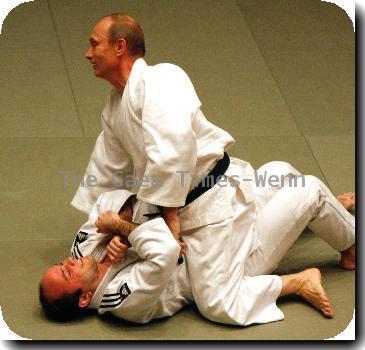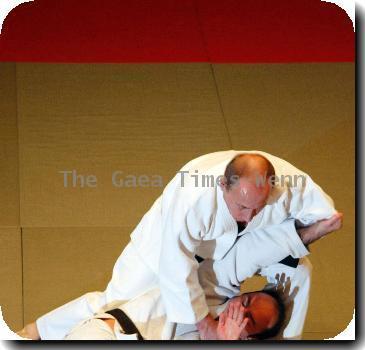Lawmakers brawl, throw eggs, smoke bombs as Ukraine OK’s lease for Russia navy until 2042
By Anna Melnichuk, APTuesday, April 27, 2010
Lawmakers brawl in Ukraine over pro-Russia measure
KIEV, Ukraine — The speaker of Ukraine’s parliament huddled under umbrellas as eggs rained down and smoke bombs filled the chamber with an acrid cloud. Then the lawmakers attacked each other, punching and brawling in the aisles.
The chaos erupted Tuesday as parliament approved a treaty allowing Russia to extend the lease on a naval base in a Ukrainian port on the Black Sea until 2042 — a move bitterly opposed by pro-Western lawmakers. Ukraine would get cheap natural gas from Russia in exchange.
Russia’s influence in Ukraine has surged since the February election victory of pro-Kremlin President Viktor Yanukovych, infuriating Ukrainians who resent Moscow’s influence and inflaming the violent passions that plague the politics of the former Soviet republic.
The controversy over the home port for the Russian Black Sea Fleet has been one of the most emotionally charged consequences of the breakup of the Soviet Union. After the Soviet collapse, Russia found one of its major fleets based in a foreign country’s port — Sevastopol, on the Crimean peninsula that extends from mainland Ukraine into the Black Sea, about 200 miles from the nearest Russian territory.
Ukrainian nationalists who resented Moscow’s long dominance of their land regarded the Russian fleet’s presence as tantamount to military occupation. Former President Viktor Yushchenko, who tilted toward the West, had vowed that the fleet’s lease of the port would not be renewed when it expired in 2017.
Yanukovych and Russian President Dmitry Medvedev agreed last week that the lease would be extended for 25 years past that expiration. Russian Prime Minister Vladimir Putin discussed the matter Monday in Kiev with Yanukovych.
As parliament speaker Volodymyr Lytvyn opened Tuesday’s legislative session, opposition members threw eggs at him, forcing him to preside behind two black umbrellas held by aides.
Opposition lawmakers draped a huge Ukrainian flag over their seats, a signal they would abstain from voting.
Lytvyn defiantly forged ahead amid the falling eggs, calling lawmakers to the stand to make their case on the Black Sea Fleet deal.
About seven minutes into the session, a smoke bomb went off underneath the draped flag and another was hurled from the back of the gallery. The chamber filled with an acrid cloud as smoke alarms went off — unprecedented scenes in the parliament.
The lawmakers’ bickering deteriorated into members throwing punches and grappling during the nationally televised session. The opposition bloc Our Ukraine-People’s Self-Defense said one of its lawmakers was hospitalized with a concussion after fighting with Yanukovych’s party.
Outside, riot police kept back crowds of opposition supporters trying to get closer to the parliament building, which was surrounded by Yanukovych supporters. Passions among the thousands of protesters became heated after the vote, but they quickly simmered down. No arrests were reported.
The base extension passed with 236 votes in the 450-member parliament.
Opposition leader Yulia Tymoshenko vowed it wouldn’t last.
“Today is a black page in the history of Ukraine’s independence. Sevastopol is the first step. The next one will be the Crimea,” she told reporters. “Parliament ratified this agreement on a treacherous path. We will change it as soon as we return to power.”
In Moscow, the measure passed 410-0 in the Russian State Duma, although some lawmakers were concerned that Ukraine might someday repeal it.
“There’s no certainty that the agreement will be fulfilled by the Ukrainian side,” said Vladimir Zhirinovsky, leader of the nationalist Liberal Democratic party. “In 10 years there may be another Yushchenko in power.”
In return for the lease extension, Russia agreed to significant discounts on natural gas exports to Ukraine.
Russian officials have calculated the discounts to be worth $40 billion over 10 years to Ukraine’s heavily industrialized economy, which has been battered by the global financial crisis.
The reduced gas prices are also likely to bolster Yanukovych’s popularity.
Analysts here say the naval base deal will trigger a deeper split in Ukrainian society between the Russian-speaking east and south, and the staunchly nationalist western region.
With the Black Sea Fleet deal, Putin can check off another goal as he sets about reasserting Russia’s political, economic and military authority over its former Soviet neighbors. Since Russia itself acquired a semblance of stability on the back of high energy prices after the chaotic 1990s, it can afford to use economic incentives to gain obedience from its neighbors.
Russian officials have watched in horror as nations once in its orbit have courted greater integration with the West — in particular, discussions in Ukraine and Georgia on possible NATO membership and increased trade and cooperation with the European Union.
Western-leaning Georgian President Mikhail Saakashvili suffered a blow to his reputation over the 2008 Russia-Georgia war, which began when he ordered the shelling of a town in a separatist-held part of the country. Russian tanks emphatically repelled the Georgian offensive, and Moscow approved the declaration of independence of South Ossetia and another rebel province, Abkhazia — both governed by Russia-friendly separatists. The West still considers the provinces sovereign Georgian territory.
The recent uprising in Kyrgyzstan that has seen the deposed President Kurmanbek Bakiyev flee to Belarus was welcomed in Russia, which has agreed to provide aid to interim officials. Bakiyev has said from exile that his reneging on a promise to Russian officials to close a U.S. military base there was a factor in his overthrow. The Manas air base, crucial to U.S.- and NATO-led missions in nearby Afghanistan, is staying open — for now.
Also Tuesday, Yanukovych addressed the Council of Europe, where more signs of his pro-Russian streak emerged. He said the Stalinist famine of the 1930s that killed millions should not be considered genocide against Ukrainians because its victims were targeted indiscriminately. Moscow has long pressed that view, which Yanukovych’s predecessor Yushchenko has rejected.
Associated Press writers Jim Heintz and David Nowak in Moscow contributed to this story.
Tags: Eastern Europe, Europe, Georgia, Kiev, Military Facilities, Moscow, Nationalism, Russia, Ukraine, Vladimir Putin

